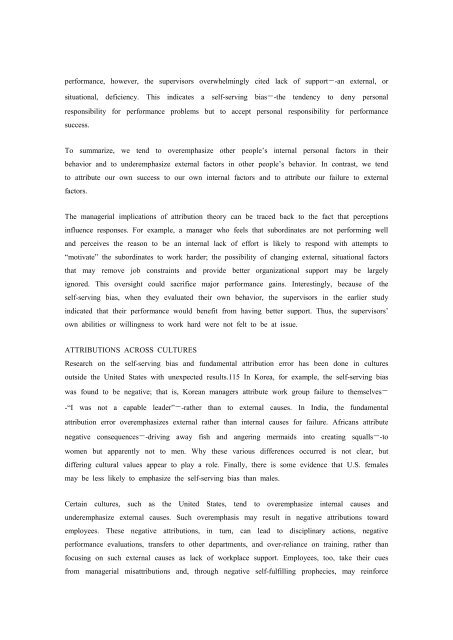4. Perception Understanding Key Concept - Uuooidata.org
4. Perception Understanding Key Concept - Uuooidata.org
4. Perception Understanding Key Concept - Uuooidata.org
Create successful ePaper yourself
Turn your PDF publications into a flip-book with our unique Google optimized e-Paper software.
performance, however, the supervisors overwhelmingly cited lack of support—-an external, orsituational, deficiency. This indicates a self-serving bias—-the tendency to deny personalresponsibility for performance problems but to accept personal responsibility for performancesuccess.To summarize, we tend to overemphasize other people’s internal personal factors in theirbehavior and to underemphasize external factors in other people’s behavior. In contrast, we tendto attribute our own success to our own internal factors and to attribute our failure to externalfactors.The managerial implications of attribution theory can be traced back to the fact that perceptionsinfluence responses. For example, a manager who feels that subordinates are not performing welland perceives the reason to be an internal lack of effort is likely to respond with attempts to“motivate” the subordinates to work harder; the possibility of changing external, situational factorsthat may remove job constraints and provide better <strong>org</strong>anizational support may be largelyignored. This oversight could sacrifice major performance gains. Interestingly, because of theself-serving bias, when they evaluated their own behavior, the supervisors in the earlier studyindicated that their performance would benefit from having better support. Thus, the supervisors’own abilities or willingness to work hard were not felt to be at issue.ATTRIBUTIONS ACROSS CULTURESResearch on the self-serving bias and fundamental attribution error has been done in culturesoutside the United States with unexpected results.115 In Korea, for example, the self-serving biaswas found to be negative; that is, Korean managers attribute work group failure to themselves—-“I was not a capable leader”—-rather than to external causes. In India, the fundamentalattribution error overemphasizes external rather than internal causes for failure. Africans attributenegative consequences—-driving away fish and angering mermaids into creating squalls—-towomen but apparently not to men. Why these various differences occurred is not clear, butdiffering cultural values appear to play a role. Finally, there is some evidence that U.S. femalesmay be less likely to emphasize the self-serving bias than males.Certain cultures, such as the United States, tend to overemphasize internal causes andunderemphasize external causes. Such overemphasis may result in negative attributions towardemployees. These negative attributions, in turn, can lead to disciplinary actions, negativeperformance evaluations, transfers to other departments, and over-reliance on training, rather thanfocusing on such external causes as lack of workplace support. Employees, too, take their cuesfrom managerial misattributions and, through negative self-fulfilling prophecies, may reinforce
















